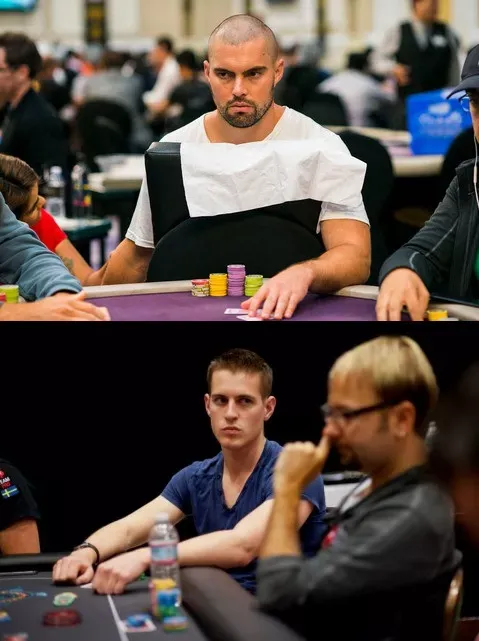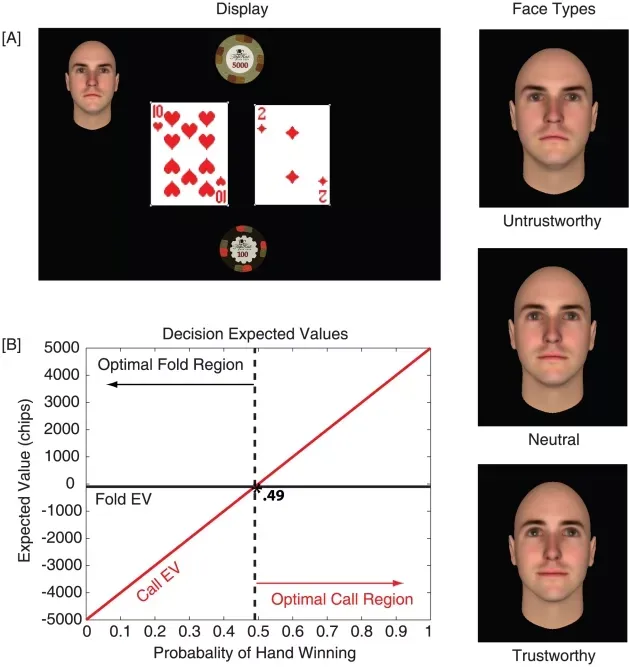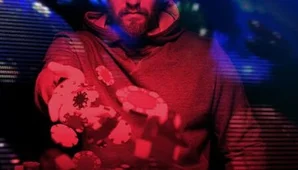In high-stakes poker, every detail matters. Victory can be achieved not only through technical skill but also by reading opponents' faces. Players carefully observe each other, trying to catch the slightest clues to gain an advantage. A study by Eric J. Schlicht (Department of Psychology, Harvard) and colleagues from MIT, Caltech, and the University of Minnesota shows how opponents' facial expressions can influence betting decisions.
The findings allow us to draw conclusions about human behavior beyond the poker table.
The Decline of the Poker Face
Poker players are known for maintaining a neutral "poker face" that doesn't reveal anything about their cards. This method was popular, especially among online players. Every experienced player remembers the piercing gaze of Mike McDonald or the robotic behavior of David Sands – perhaps the most famous masters of the poker face.

However, this style seems to be declining. Among the leaders in career tournament winnings from the Hendon Mob website, only a few use a fixed mask instead of a face. The behavior of others during hands lies somewhere between eccentricity and bland friendliness. Veterans like the talkative Daniel Negreanu (7th place) and Erik Seidel (10th place) do not hide their emotions, while only Phil Ivey (12th place) can be considered a classic of the gloomy and threatening style.
Schlicht's research, conducted and published in 2010, suggests that the most effective facial expression may not be neutral. According to his findings, trustworthy individuals can be more influential, affecting opponents in subtle but tangible ways.
The Experiment
To investigate this phenomenon, researchers developed a simplified version of Texas Holdem. Participants received no feedback on the results of their actions, ensuring that their choices were influenced only by basic poker knowledge and impressions of their opponent's appearance.
14 participants aged 19 to 36, who had passed a test on Holdem rules but had limited experience, were given the following instructions:
– They are in the Big Blind in all hands and have already put in 100 chips from a 5,000 stack.
– Their only opponent is All-In for 5,000.
– The participant needs to choose between calling and folding, considering their hand and the community cards.
– The probability of winning depends on the opponent's playing style, but there is no information about their characteristics.
– The results of the hands will not be shown until the end of the experiment.
The experimenters did not advertise that the facial expressions of the opponents were taken from a specially created database and grouped into three categories: trustworthy, neutral, and untrustworthy. They also didn't tell participants that their virtual opponents always went All-In with a random hand.

- A correct call in one hand brought the participant $15.
- A wrong call – $5.
- A fold – in any case $10.
300 hands were played by each, 100 against each category of persons.
Results of the Study
The analysis was carried out in three areas:
Speed of decision-making: Participants thought significantly longer when faced with credible opponents. It also took much longer to make the correct fold. Correct calls were made just as quickly as against other groups. There were no differences in behavior against neutral and suspicious opponents. The authors believe that faces expressing positive emotions require more cognitive analysis.
Accuracy of decisions: Participants made more mistakes against credible opponents. They folded more often, even when it was a suboptimal decision. This tendency was especially true for marginal hands, where the decision to continue or fold was less clear. Data suggests that players may subconsciously believe that opponents with credible faces are playing with stronger hands. Interestingly, suspicious and even threatening individuals have little influence on decision making. This challenges the common assumption that negative traits confer greater authority in competitive environments. In contrast, positive emotional signals may be more disruptive, causing doubts and mistakes.
Frequency of calls: Participants made fewer calls against credible opponents than against neutral opponents (p<.01). For the "trustworthy/suspicious" pair, a similar trend appeared with a lower P-value (p<.06) and cannot be classified as strong.
Overall, the study found that participants made 3% more errors against trustworthy faces than against other types. This number may not seem like much, but the authors point out that the ROI of elite online poker players is no more than 7% (citing Sharkscope data without further context, likely referring to SNG tournaments).
Conclusions Beyond the Poker Table
The implications of this study extend far beyond poker. In many areas of life, from business negotiations to political campaigns, we make snap judgments based on appearance. Understanding how these judgments influence our decisions can provide valuable insights.
In business, managers often rely on first impressions when meeting new clients or partners. A trustworthy person can influence negotiations, leading to more favorable outcomes for the perceived "good" participant. Similarly, in politics, candidates with attractive personalities can gain an advantage over their opponents in the eyes of voters.
This work is part of a larger area of research examining how first impressions are formed and how they influence our decisions. Previous studies have established that rapid unconscious evaluations can influence cooperative behavior in economic games. Schlicht et al.'s study extends this finding to competitive scenarios.
When we meet a new person, our brain quickly scans various traits, making judgments about that person's level of competence and trustworthiness. These assessments are often made within milliseconds and can significantly influence our behavior.
For live professionals, it may be worth considering the potential benefits of creating a trusted image. For business or political professionals, knowing the impact of their facial expressions on others can help them manage their image more effectively.
Conclusion
Like many other studies that use poker, the work of Eric Schlicht et al. was not done to develop an optimal poker strategy. Of the 14 participants, at least 12 cannot be classified as poker professionals. The involvement of competent participants in the experiment may lead to different results, and the authors' conclusions should be extrapolated to business and politics with certain reservations. If any readers are engaged in scientific work at the intersection of psychology and statistics, this could serve as a good topic for a thesis.
Schlicht himself, having received his Ph.D. at Harvard, worked in machine learning, created a couple of startups, and now works as a senior researcher at a company that trains blue-collar workers in virtual reality.




